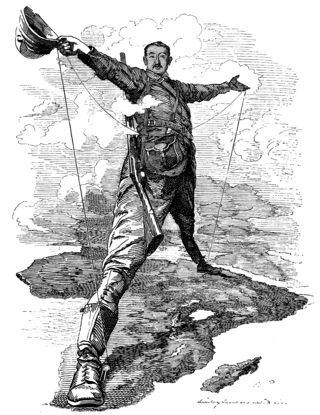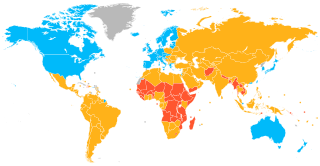Related Research Articles

The International Monetary Fund (IMF) is a major financial agency of the United Nations, and an international financial institution funded by 190 member countries, with headquarters in Washington, D.C. It is regarded as the global lender of last resort to national governments, and a leading supporter of exchange-rate stability. Its stated mission is "working to foster global monetary cooperation, secure financial stability, facilitate international trade, promote high employment and sustainable economic growth, and reduce poverty around the world."

Imperialism is the practice, theory or attitude of maintaining or extending power over foreign nations, particularly through expansionism, employing both hard power and soft power. Imperialism focuses on establishing or maintaining hegemony and a more or less formal empire. While related to the concepts of colonialism, imperialism is a distinct concept that can apply to other forms of expansion and many forms of government.

The economy of Kenya is market-based with a few state enterprises. Kenya has an emerging market and is an averagely industrialised nation ahead of its East African peers. Currently a lower middle income nation, Kenya plans to be a newly industrialised nation by 2030. The major industries driving the Kenyan economy include financial services, agriculture, real estate, manufacturing, logistics, tourism, retail and energy. As of 2020, Kenya had the third largest economy in Sub-Saharan Africa, behind Nigeria and South Africa. Regionally, Kenya has had a stronger and more stable economy compared to its neighboring countries within East Africa.By 2023, the country had become Africa's largest start-up hub by both funds invested and number of projects.

The economy of Lesotho is based on agriculture, livestock, manufacturing, mining, and depends heavily on inflows of workers’ remittances and receipts from the Southern African Customs Union (SACU). Lesotho is geographically surrounded by South Africa and is economically integrated with it as well. The majority of households subsist on farming. The formal sector employment consist of mainly female workers in the apparel sector, while male migrant laborers work primarily either as miners in South Africa for 3 to 9 months or in the employment of the Government of Lesotho (GOL). Half of the country's population work in informal crop cultivation or animal husbandry.
The economy of Liberia is extremely underdeveloped, with only $3.222 billion by gross domestic product as of 2019, largely due to the First (1989–1996) and Second Liberian Civil War (1999–2003). Liberia itself is one of the poorest and least developed countries in the world, according to the United Nations.

A developing country is a sovereign state with a less developed industrial base and a lower Human Development Index (HDI) relative to other countries. However, this definition is not universally agreed upon. There is also no clear agreement on which countries fit this category. The terms low and middle-income country (LMIC) and newly emerging economy (NEE) are often used interchangeably but refers only to the economy of the countries. The World Bank classifies the world's economies into four groups, based on gross national income per capita: high, upper-middle, lower-middle, and low income countries. Least developed countries, landlocked developing countries and small island developing states are all sub-groupings of developing countries. Countries on the other end of the spectrum are usually referred to as high-income countries or developed countries.

The Council of Economic Advisers (CEA) is a United States agency within the Executive Office of the President established in 1946, which advises the president of the United States on economic policy. The CEA provides much of the empirical research for the White House and prepares the publicly-available annual Economic Report of the President. The council is made up of its chairperson and generally two to three additional member economists. Its chairperson requires appointment and Senate confirmation, and its other members are appointed by the President.

The 1997 Asian financial crisis was a period of financial crisis that gripped much of East and Southeast Asia during the late 1990s. The crisis began in Thailand in July 1997 before spreading to several other countries with a ripple effect, raising fears of a worldwide economic meltdown due to financial contagion. However, the recovery in 1998–1999 was rapid, and worries of a meltdown quickly subsided.

The economy of Africa consists of the trade, industry, agriculture, and human resources of the continent. As of 2019, approximately 1.3 billion people were living in 53 countries in Africa. Africa is a resource-rich continent. Recent growth has been due to growth in sales, commodities, services, and manufacturing. West Africa, East Africa, Central Africa and Southern Africa in particular, are expected to reach a combined GDP of $29 trillion by 2050.
Structural adjustment programs (SAPs) consist of loans provided by the International Monetary Fund (IMF) and the World Bank (WB) to countries that experience economic crises. Their stated purpose is to adjust the country's economic structure, improve international competitiveness, and restore its balance of payments.

The study of the economies of the ancient city-state of Rome and its empire during the Republican and Imperial periods remains highly speculative. There are no surviving records of business and government accounts, such as detailed reports of tax revenues, and few literary sources regarding economic activity. Instead, the study of this ancient economy is today mainly based on the surviving archeological and literary evidence that allow researchers to form conjectures based on comparisons with other more recent pre-industrial economies.
Business history is a historiographical field which examines the history of firms, business methods, government regulation and the effects of business on society. It also includes biographies of individual firms, executives, and entrepreneurs. It is related to economic history. It is distinct from "company history" which refers to official histories, usually funded by the company itself.

The Great Depression (1929–1939) was a severe global economic downturn that affected many countries across the world. It became evident after a sharp decline in stock prices in the United States, leading to a period of economic depression. The economic contagion began around September 1929 and led to the Wall Street stock market crash of 24 October. This crisis marked the start of a prolonged period of economic hardship characterized by high unemployment rates and widespread business failures.

The historiography of the British Empire refers to the studies, sources, critical methods and interpretations used by scholars to develop a history of the British Empire. Historians and their ideas are the main focus here; specific lands and historical dates and episodes are covered in the article on the British Empire. Scholars have long studied the Empire, looking at the causes for its formation, its relations to the French and other empires, and the kinds of people who became imperialists or anti-imperialists, together with their mindsets. The history of the breakdown of the Empire has attracted scholars of the histories of the United States, the British Raj, and the African colonies. John Darwin (2013) identifies four imperial goals: colonising, civilising, converting, and commerce.

"The Imperialism of Free Trade" is an academic article by John Gallagher and Ronald Robinson first published in The Economic History Review in 1953. The article was influential in the debate concerning the causes of British imperial expansion in the 19th-century which, since John A. Hobson's Imperialism: A Study (1902), had focused on economic motivation. Instead, Gallagher and Robinson claimed that the New Imperialism – "the new spate of imperial expansion that gathered momentum from the 1880s" – could be best characterised as a continuation of a longer-term policy begun in the 1850s in which informal empire, based on the principles of free trade, was favoured over formal imperial control unless circumstances made such rule impossible. As well as reigniting scholarly interest in theorizing New Imperialism, the article helped launch the Cambridge School of historiography.

Global apartheid is a term used to describe how Global North countries are engaged in a project of "racialization, segregation, political intervention, mobility controls, capitalist plunder, and labor exploitation" affecting people from the Global South. Proponents of the concept argue that a close examination of the global system reveals it to be a kind of apartheid writ large with striking resemblance to the system of racial segregation in South Africa from 1948 to 1994, but based on borders and national sovereignty.

Joel S. Hellman is an American political scientist currently serving as dean and distinguished professor in the practice of development at the Edmund A. Walsh School of Foreign Service at Georgetown University. He was appointed in July 2015 and led the Walsh School during the celebration of its centennial anniversary in 2019. Formerly, he was chief institutional economist at the World Bank.

Climate change in South Africa is leading to increased temperatures and rainfall variability. Evidence shows that extreme weather events are becoming more prominent due to climate change. This is a critical concern for South Africans as climate change will affect the overall status and wellbeing of the country, for example with regards to water resources. Just like many other parts of the world, climate research showed that the real challenge in South Africa was more related to environmental issues rather than developmental ones. The most severe effect will be targeting the water supply, which has huge effects on the agriculture sector. Speedy environmental changes are resulting in clear effects on the community and environmental level in different ways and aspects, starting with air quality, to temperature and weather patterns, reaching out to food security and disease burden.
Ayodeji Oladimeji Olukoju is a Nigerian University distinguished professor of history at the University of Lagos, Nigeria. He was a two-term vice chancellor of Caleb University, Imota between 2010 and 2016. Olukoju's research interests are in the area of maritime, transport, economic, social, corporate and urban history of Nigeria.
References
- ↑ "Stuart Jones, 86: Economic historian in South Africa and tea lover". The Times . 21 December 2019. Retrieved 7 February 2020.
- ↑ "Imperial Banks of South Africa". The South African Journal of Economics. 65 (3): 195–198. 1997. doi:10.1111/j.1813-6982.1997.tb01372.x.